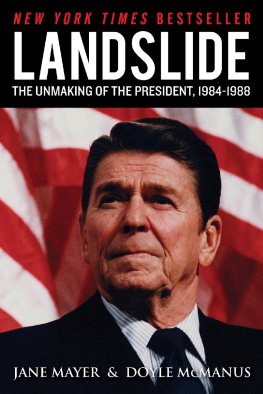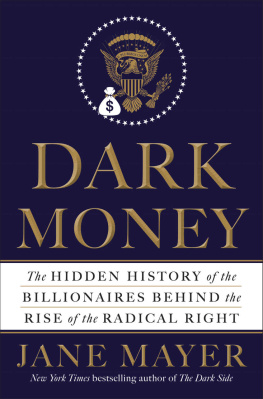LANDSLIDE
THE UNMAKING OF
THE PRESIDENT,
19841988

Jane Mayer
and
Doyle McManus
FOR OUR PARENTS
Contents
By Jane Mayer & Doyle McManus
T HE T WENTY-FIFTH A MENDMENT to the U.S. Constitution was designed to repair a gap in the founding document: What happens if a president is unable to do the job?
The measure was adopted after the assassination of President John F. Kennedy in 1963, when members of Congress realized that even if a president were comatose, he would still be the only official authorized to command the nuclear arsenal.
The amendments first three sections are straightforward. Section 1 provides that If a president dies in office or resigns, the vice president will succeed him. Section 2 provides that if there is no vice president, the president will nominate a new one.
Section 3 provides that if a president notifies Congress that he is unable to carry out his duties, the vice president will act in his stead until the president recovers. Two presidents, Ronald Reagan and George W. Bush, invoked that provision for brief periods when they underwent surgery.
Section 4 is more complicated: What if the president is unable to discharge the duties of the office, but is unable or unwilling to make a decision to step aside?
In that case, the vice president and a majority of the Cabinet can notify Congress that the president should be removed. If the president objects, Congress can vote on the question. A two-thirds majority in each house is required to oust the chief executive from office.
That section, which could legalize a virtual coup dtat, has never been used. But it was seriously considered once, in 1987, when Reagan was reeling from the scandal ensuing from his secret decision to sell weapons to Iran.
Thirty years later, the Twenty-fifth Amendment was rediscovered when President Donald Trumps erratic conduct prompted critics to suggest that he should be removed. According to press accounts, Trumps first secretary of state, Rex Tillerson, called the president a moron, and his chief of staff, John Kelly, called him an idiot. Both denied having used those words, but the general sentiment was widely shared, even (in private) by other Republicans.
So it may be useful to revisit the Reagan episode to see what lessons it holds for a vice president, Cabinet and Congress of a later generation.
In February 1987, Reagans White House was in a state of organizational collapse. The Iran-contra scandal had sent the presidents popularity into a tailspin and thrown Cabinet members and aides into battle against each other. Visitors described Reagan as listless, confused, and unable to bring the crisis under control.
At the urging of his wife, Reagan replaced chief of staff Donald T. Regan with a savvy political veteran, former Senator Howard H. Baker. Baker dispatched aides to interview the White House staff, and his advisor James Cannon returned with an alarming report.
Cannon said White House aides told him Reagan was inattentive and inept. The president couldnt seem to focus on his job, they said. He didnt read his briefing papers. He spent hours upstairs in the White House residence watching television instead of coming to work. He seemed depressed, even dysfunctional.
Bakers first priority, Cannon wrote in a memo, was to decide whether Reagan was fit to remain in office at alland whether the Twenty-fifth Amendment should be employed.
Baker took the warning seriously and spent half a day on March 2 observing Reagan's behavior. That morning, at least, the president seemed fine, and the new chief of staff decided no extraordinary measures were needed. Then he held a news conference to rebut speculation that Reagan was losing his gripwith comments that betrayed his earlier concerns.
Is this president fully in control of his presidency? Is he alert? Is he fully engaged? Is he in contact with the problems? Baker asked the assembled reporters. Its just one days experience and maybe thats not enough, but today he was superb.
We now know that Reagans condition was almost certainly worse than was apparent on that March morning in 1987. In 1993, four years after leaving the White House, he was formally diagnosed with Alzheimers disease. But the president had displayed signs of deterioration much earlier.
As biographer Lou Cannon, the reporter who probably knew Reagan best, wrote in 1991: The sad, shared secret of the Reagan White House was that no one in the presidential entourage had confidence in the judgment or the capacities of the president.
Reagans acuity had been questioned long beforenotably in 1984, when he lost his train of thought during a campaign debate with Democratic nominee Walter F. Mondale. I was afraid hed fall down, Mondale said later, adding that he wondered whether Reagan was beginning to lose it. The presidents son, Ron Reagan, was concerned, too. He looked tired and bewildered, Ron wrote.
In 1987, amid the Iran-contra melee, young Ron visited his father in the White House and found him depressed and listless. I could not shake my feeling that something was amiss, he wrote. At about the same time, members of the White House commission investigating the scandal were shocked by the presidents confusion and inability to remember events.
After Reagan left office in 1989, his condition worsened. Called before a grand jury in 1991, he was unable to remember basic information about events in which he had participated. Videotapes show him distressed by his memory loss. Its like I wasnt president at all, he said.
Alzheimers is a difficult disease to diagnose, especially in its early stages. Not until 1993 did Reagans doctors make a definitive finding.
As a result, when he was still in the White House, Reagans condition was always ambiguousand that made using the Twenty-fifth Amendment impractical. The measure was designed primarily for a situation in which a president was physically incapacitated, not an imprecise state of gradual mental declinelet alone general unfitness for office.
If you read the debates... unpopularity is not included, poor judgment, incompetence, laziness, or impeachable conductnone of that, John D. Feerick, a professor at Fordham Law School who helped draft the amendment, said later.
The procedural obstacles are daunting, too. The first step is for the vice president and the Cabinet to decide the president needs to gobut that means ousting the leader who gave them their jobs.
In 1987, Vice President George H.W. Bush was preparing to run for president as Reagans political heir. Even if Baker had proposed invoking the Twenty-fifth Amendment, Bush, who cast himself as a Reagan loyalist, would almost surely have resisted.
The vice president is the worst person to decide presidential inability, historian James McGregor Burns warned the Senate Judiciary Committee when it considered the proposed amendment in 1964. Not because he would grab for power, though this is always possible, but the opposite: He would hesitate to take any action that would give the appearance of over-eagerness.
That impediment remains. No vice president is likely to propose removing the president, an inherently traumatic action, without overwhelming support from his own party. "It's easier to impeach than invoke the Twenty-fifth Amendment," the president of the National Constitution Center, Jeffrey Rosen, concluded in 2017.














